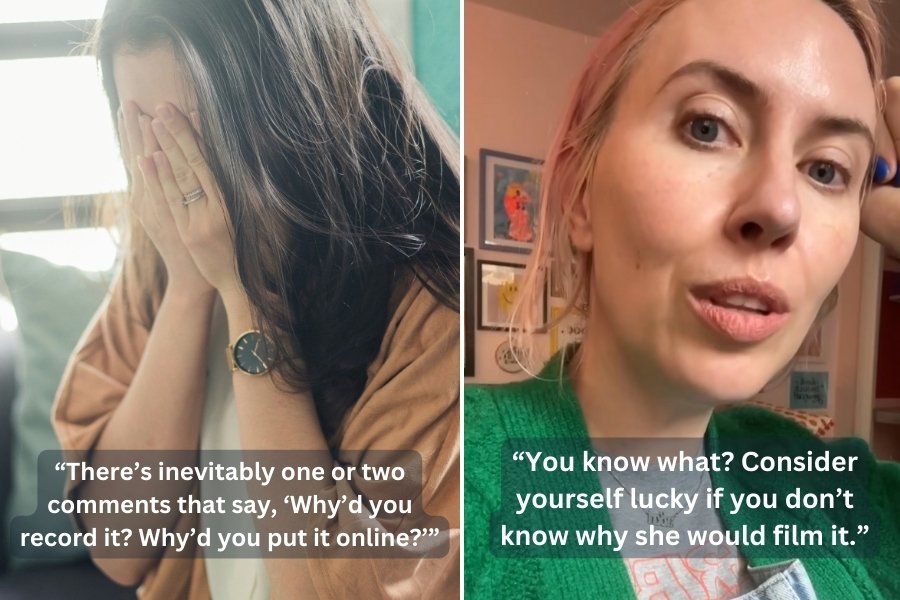There are basically two universal truths about grieving a loved one. One, there is no “normal” way to grieve—it’s entirely individual. And two, no one should judge another person’s grief process.
A video of a woman picking up her husband’s ashes started an important conversation about what grief looks like and why someone would choose to share such a personal moment with the world.
Adriana Sansam’s husband, Eric, died unexpectedly in the spring of 2023 at age 30, turning the beautiful life they were building with their three small children upside down. Since Eric’s death, Sansam has been sharing snippets of her grieving process on her Instagram page, and one of those snippets was a video of her in her car before and after picking up Eric’s ashes. We see her break down before she leaves the car and again after she returns and cradles the urn that holds her husband’s remains.
Some people questioned and even criticized Sansam for filming and sharing those moments, which prompted grief advocate Nora McInerny to post a video response in her defense.
McInerny, whose husband died in 2014, has given a Ted Talk on grief, has written multiple books on the topic and is the host of the award-winning podcast “Terrible, Thanks for Asking” and the daily podcast “It’s Going To Be Okay.” In other words, she”s well-versed in the grieving process.
In the caption of her response, McInerny wrote:
“You don’t have to grieve publicly, but I’ll personally fight anyone who wants to judge people who *do* put it out there. Consider it a public service for those who haven’t walked that path yet; our culture is so grief-averse that we are rarely forced to see someone else’s pain and anguish. You don’t have to like it, but you *also* don’t have to comment on it.”
In the video, she explains why someone might choose to film an intense grieving moment.
“I wish I had any video evidence of how this felt,” she said. “Grief is so disorienting. It feels like you made it up. And grief needs a witness. And you know what? Consider yourself lucky if you don’t know why she would film it. But she’s filming it for you. She’s filming it so that if you find yourself in this unfortunate position or know someone who does, you know what grief actually looks like.”
McInerny is right. We don’t see grief very often in our society, and it’s even more rare that we see it being experienced and expressed publicly. People usually do their intense grieving in private, either because that’s what they feel most comfortable with or because that’s what other people feel most comfortable with.
But grieving isn’t comfortable. It’s messy and intense and unpredictable. It has no set trajectory and no timeline. And if we never see grief in all its raw, real glory, we might feel like something’s wrong with us if (or when) we go through a tragic loss ourselves.
Those commenting negatively may have learned something if they’d simply read some of the other comments on Sansam’s video. Person after person shared their stories of understanding and solidarity as well as their gratitude to Sansam for showing what she was experiencing:
“❤️? Some people may think it’s strange to post about grief, but honestly I appreciate every single account I come across ? and send love and healing energy to everyone who understands the loss of a loved one. ??”
“You know that hug-the-vase thing? Yes, that’s real, because that’s the closest we’ll ever get to hugging them again. I hugged my father’s urn every chance I could, knowing I can’t hug him again til the next life. ?? Hug your loved ones if you still get a chance, but that hug then breaking down while doing it. Thats as real as it gets. ? Stay strong, praying for you. ??”
“I’m so sorry… My daughter Azalea passed away in December and picking up her ashes was one of the hardest days of my life. It made her death feel so final. ?”
“So sorry for your loss! I lost my wife in December. She was only 47. I also lost my son in June who was only 12. Know you’re not alone. Lean on friends, lean on family. Most important, talk to him every day. Ask him for signs to help ease the pain. He will come through for you. Love lasts forever! ??❤️”
“I lost my husband young… it’s a painful thing to live with❤️❤️what I can tell you is that the pain and grief will become less consuming. You can do this….“
“I wept at this video for you and for my 42 year old self that had to do the same thing. I remember going by myself to pick them up and just breaking down in the car. I’m so so sorry you went through this at such a young age! Hugs, my widow sister.” ❤️
“I picked my Mom up in January. I drove the roads we knew so well through San Diego and talked to her about the memories in each area. I think I just kept talking because I would have lost my mind thinking about the reality of what I was doing. Thank you for sharing such a vulnerable moment. May he rest in peace.”
The bottom line is if we haven’t been through it ourselves, we have no right to judge. And even if we have experienced something similar, everyone’s process is different and what seems weird to one person might be normal or necessary for another, so we still shouldn’t judge.
Thank you, Nora McInerny, for the important reminder.


































